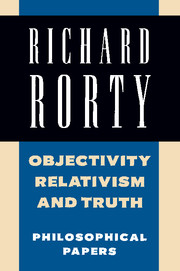Book contents
- Frontmatter
- Contents
- Acknowledgments
- Introduction: Antirepresentationalism, ethnocentrism, and liberalism
- Part I
- Part II
- PART III
- The priority of democracy to philosophy
- Postmodernist bourgeois liberalism
- On ethnocentrism: A reply to Clifford Geertz
- Cosmopolitanism without emancipation: A response to Jean-François Lyotard
- Index of names
On ethnocentrism: A reply to Clifford Geertz
Published online by Cambridge University Press: 05 June 2012
- Frontmatter
- Contents
- Acknowledgments
- Introduction: Antirepresentationalism, ethnocentrism, and liberalism
- Part I
- Part II
- PART III
- The priority of democracy to philosophy
- Postmodernist bourgeois liberalism
- On ethnocentrism: A reply to Clifford Geertz
- Cosmopolitanism without emancipation: A response to Jean-François Lyotard
- Index of names
Summary
In his provoctive paper on “The Uses of Diversity,” Professor Geertz asserts that ethnocentrism relegates gaps and asymmetries between individuals or groups to “a realm of repressible or ignorable difference, mere unlikeness.” This is a good description of how we treat people whom we think not worth understanding: those whom we regard as irredeemably crazy, stupid, base, or sinful. Such people are not viewed as possible conversational partners, but, at most, as means to ends. We think we have nothing to learn from such people, for we would rather die than share the beliefs which we assume are central to their self-identities. Some people think of Jews and atheists in these terms. Others think this way about Nazis and religious fundamentalists.
When we bourgeois liberals find ourselves thinking of people in this way – when, for example, we find ourselves reacting to the Nazis and the fundamentalists with indignation and contempt – we have to think twice. For we are exemplifying the attitude we claim to despise. We would rather die than be ethnocentric, but ethnocentrism is precisely the conviction that one would rather die than share certain beliefs. We then find ourselves wondering whether our own bourgeois liberalism is not just one more example of cultural bias.
This bemusement makes us susceptible to the suggestion that the culture of Western liberal democracy is somehow “on a par” with that of the Vandals and the Ik.
- Type
- Chapter
- Information
- Objectivity, Relativism, and TruthPhilosophical Papers, pp. 203 - 210Publisher: Cambridge University PressPrint publication year: 1990
- 4
- Cited by



